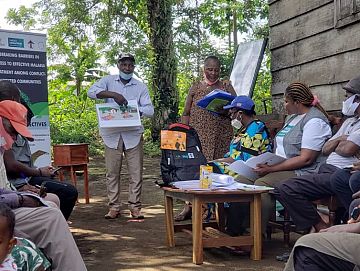Community dialogues increase knowledge and improve uptake of malaria services among internally displaced communities in the Southwest and Littoral regions of Cameroon
22 July 2022
Globally, Cameroon is among the 15 highest burden malaria countries, with three percent of all global malaria cases and three percent of malaria deaths in 2019; this represents the third highest number of malaria cases in Central Africa (12.7 percent of cases). Diagnosis and treatment are limited by poor service coverage, due to conflict in the country and subsequent displacement of people as well as limited funding.
Since 2016, armed violence in the Northwest and Southwest regions of the country have led to the displacement of over 700,000 people and the closure of over 35 percent of health facilities. Displaced and host populations are reliant on community and primary health services, with limited supervision, and a drug supply system that struggles to adapt to population movement. The health services are only free at the point of access for children under five.
Reach Out Cameroon, Malaria Consortium and Konmofamba Action Sans Frontière (KASAFRO) are currently undertaking a three-year research project to improve access to malaria case management for conflict-affected populations in Cameroon, aligned with the country’s 2019–2023 National Strategic Plan for malaria control. This research is developing, implementing and evaluating scalable, replicable, and innovative approaches to improve access to effective malaria case management through community-based services in conflict-affected and host communities in the South-West and Littoral regions of Cameroon by 2023.
The key tool being implemented is the use of community dialogues – a community engagement approach developed and pioneered by Malaria Consortium – to prevent and control malaria in Cameroon. Helen Hawkings, Malaria Consortium’s Social and Behaviour Change Specialist, commented:
“We have been really impressed with the level of community participation and ownership of the community dialogue process with communities electing volunteer facilitators who then received training and support to carry out the monthly dialogues. The first dialogues saw a high level of engagement with a wide spectrum of community members and communities offering their own resources to ensure the success of the approach.”
Elizabeth Berryman, Senior Technical Advisor at Malaria Consortium UK, added:
“The project aims to understand key barriers to effective malaria case management and service uptake; design innovative community engagement interventions to strengthen malaria prevention and control and improve quality of malaria care. This is especially important in conflict settings where displaced communities are highly vulnerable to malaria but unable to adequately access preventive measures and seek the right treatment at the right time due to financial and access barriers.”
This malaria case management research is an opportunity to support communities to benefit from community dialogues and includes addressing weaknesses in community health services, supporting supportive supervision and a health voucher system to ensure that people with severe malaria get access to lifesaving treatment – a key need identified by the displaced communities. Malaria Consortium seeks to measure the impact of the community dialogue intervention on malaria morbidity, knowledge and health seeking behaviour to provide clear recommendations to the Cameroon government and Global Fund who support community health services.
The project is funded by L'Initiative on AIDS, Tuberculosis and Malaria (formerly the 5% Initiative), a facility implemented by Expertise France – the French agency that designs and implements international technical cooperation projects. Complementing the work of the Global Fund to Fight AIDS, Tuberculosis and Malaria, L'Initiative aims to strengthen the health impact of programmes in 19 countries eligible for official development assistance from France, through developing the capacity of partner State personnel and supporting innovative approaches to respond to these three deadly pandemics.

Related content
Social behaviour change capacity statement
The Community Dialogue Approach
12 July 2022Exploring equity, participation and gender sensitivity through community-led solutions to antimicrobial resistance
Latest news
- International summit calls for AMR accountability in public health interventions21st March 2024
- Global SMC community celebrates new milestone at SMC Alliance Annual Meeting in Nigeria6th March 2024
- Scaling up key interventions could halve pneumonia-related childhood mortality13th February 2024
- Malaria Consortium and eGov Foundation join Mozambique’s national malaria programme to digitalise seasonal malaria chemoprevention campaigns8th February 2024
- World’s first malaria vaccine rollout launched in Cameroon22nd January 2024
- Digital solutions driving equitable access to health6th December 2023